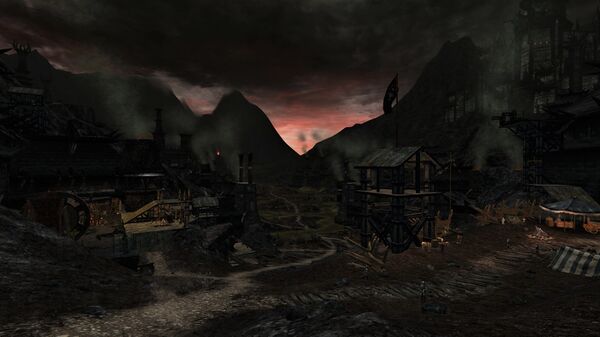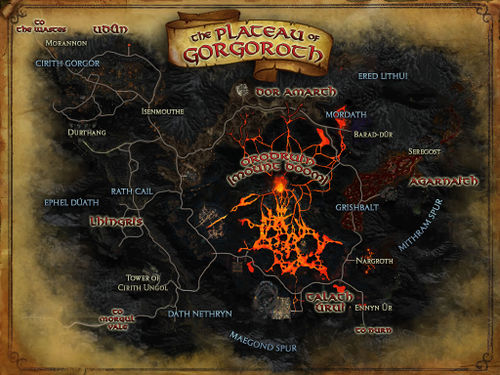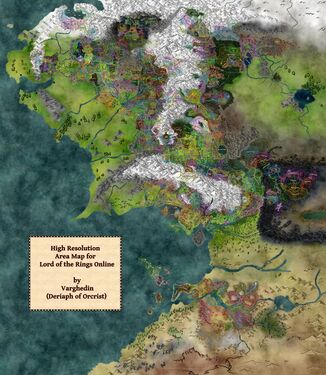Udûn
| Region: | The Plateau of Gorgoroth |
| Dungeon(s): | Anglach Durthang |
| Landmark(s): | Maudhúl Ghûg Maudhúl Târ Maudhúl Târ Overlook Maudhúl Vôr Morannon Mornaur Mornaur Lookout Rhûd Vorn Rogkalúr |
| Settlement(s): | Udûn Foothold |
| Connecting Area(s): |
Cirith Gorgor Dor Amarth Lhingris |
| Levels: | Mainly 106 - 108, and 115 in places |
| Resource tier: | T11 - Doomfold |

Location
Udûn (Sindarin for Hell or Underworld, literally Deep-hidden) is an area within the Plateau of Gorgoroth.
Udûn connects Gorgoroth to the lands beyond and is thus sometimes called "Mordor's antechamber". This polluted valley holds the great forges, quarries, and parade grounds that readied Sauron's armies for war.
It lies between Cirith Gorgor and the Morannon in the north-west and the Isenmouthe in the south-east. The castle of Durthang overlooks Udûn from the mountain spur in the south-west, while across the valley the great foundry of Anglach stands on the inner face of the Ered Lithui.
Shadow of Mordor
The base Shadow of Mordor value is -10 along the main road, and -20 further into the hills.
Areas used in Allegiance quests have shadow value of -100.
Udûn Locations
Locations found within the area of Udûn are listed below.
Unmarked level 115 locations used in Allegiance quests.
Connected Locations
NPCs
See "list of NPCs" within Udûn
Quests
The Black Book of Mordor: Where the Shadows Lie (Requires purchase of the Mordor Expansion.)
| The Black Book of Mordor: Chapter 1 |
|---|
|
Previous: Volume IV, Book 9 The Black Book of Mordor: Chapter 1
Next: The Black Book of Mordor: Chapter 2
|
The Allegiance System has a number of quests as well for each area, once you hit level [110]:
| Udûn Allegiance Quests |
|---|
|
Deeds
See The Plateau of Gorgoroth Deeds - Udûn for an overview of all deeds that complete in Udûn.
Creatures
Most creatures in Udûn are of levels 106-108, however there are a few areas inhabited by level 115 creatures. These areas are mostly penetrated during Allegiance quests. There are also wandering threats and scrouges at level 115, plus other mobs that pop up during allegiance quests. Similarly the Fortresses have level 115 Mobs when they are entered for Resource quests, and the lower level when entered normally.
The following creatures are found in the landscape of this area:
Level 106-108 Creatures
- Black Númenórean Warrior (Udûn)
- Black Uruk Enforcer
- Búktavul - during quest
- Durthang Spy
- Enforcer of Ugrukhôr
- Forge-worker (Dwarf)
- Forge-worker (Goblin)
- Forge-worker (Orc)
- Frenzied Nurnhoth
- Gore-crow
- Khundolar Archer (Udûn)
- Khundolar Warrior (Udûn)
- Mordor Archer (Udûn)
- Mordor Captain (Udûn)
- Mordor Defiler (Udûn)
- Mordor Olog
- Mordor Warrior (Udûn)
- Released Dire-horn - during quest
- Slag-slug
- Udûn Burrower
- Udûn Hammerer
- Udûn Spawner
- Udûn Stone-splitter
- Udûn Slag-Heaver
Level 115 Creatures
- Nuzdum - Scourge
- Ravaging Warg (Gorgoroth) - Scourge
- Sharlag Man-breaker - Hidden Threat
- Thormurg the Slaughterer - Hidden Threat
- Plákash - during quest
- Goblin Forgeworker - during Allegiance Quest
- Captain Zaboth - during Allegiance Quest
- Defiler Bulmus - during Allegiance Quest
- Málkon - during Allegiance Quest
- Mordor Archer (Gorgoroth) - during Allegiance Quest
- Mordor Captain (Gorgoroth) - during Allegiance Quest
- Mordor Defiler (Gorgoroth) - during Allegiance Quest
- Mordor Warrior (Gorgoroth) - during Allegiance Quest
Maps
-
Map of Udûn
-
Map of the Plateau of Gorgoroth
-
Areas of Middle-earth
Navigation
| Settlements and Landmarks of Udûn
| ||
|---|---|---|
| Settlements: | Udûn Foothold | |
| Landmarks: | Maudhúl Ghûg • Maudhúl Târ • Maudhúl Târ Overlook • Maudhúl Vôr • Mornaur • Mornaur Lookout • Rhûd Vorn • Rogkalúr | |
| Interiors: | Anglach • Durthang | |
| Instances: | Anglach, the Great Foundry • The Tower of Durthang | |
Lore
Dates: Constructed in the beginning of the World, ruined c.4,000 years before the beginning of the First Age Location: The far north of the World Pronunciation: oo'doon Meaning: The Sindarin form of an originally Quenya name, probably meaning 'Underworld'
- Udûn was the Sindarin name of the fortress of the first Dark Lord in the far north of the World. It was the first and greatest of his citadels, delved in the earliest days, the home to hosts of demons and monsters. From Udûn, the Dark Lord troubled the world for millennia. From there, he drove the Valar out of their dwelling-place in Middle-earth, and into the West. At the time of the awakening of the Elves, though, the Valar attacked Udûn in full force, and destroyed it utterly, carrying its master back to Valinor as their prisoner.
- Udûn also appears as a name for the northern valley of Mordor that lay behind the Morannon. No doubt Sauron chose this name in memory of his ancient master's greatest stronghold [1] Udûn is also translated as "hell" and is said to have been beneath Thangorodrim.[2]
- In the Second Age, it is believed, Sauron here ordered the construction of mines, forge-works, and parade grounds for the building of an army against the kingdoms of Men and Elves. He also discovered strange ores, with which he developed Morgul-steel, a secret alloy with dark enchantments. The knife Gulthauk and Mormagáth the Shadow-hammer were the greatest of the Morgul-weapons, so the Dark Lord took them for himself.[3]
- After the Last Alliance of Elves and Men breached the Morannon, Sauron's forces quickly retreated through Udûn to make a stand their Barad-dûr. The Last Alliance destroyed what works they could along the way, but forwent a thorough clearing of the valley in favour of pursuing the enemy host. Seven years later, after the victory of the Last Alliance, Isildur, King of Gondor, returned and ordered the building of Durthand, the Black Shield.[3] This fortress was held by an order of Gondorian sentinels called the Thandrim. The Thandrim maintained their vigil for at least sixteen centuries, but eventually Gondor lost its hold on Mordor.[note 1] Ugrukhôr, Captain of the Pit, claimed Durthand and renamed it to Durthang, the Dark Oppression, in mockery of its original name.[4] He restored and extended the fortifications and foundries of Udûn, and at this time Anglach and Mornaur were built.[3]
- Following Sauron's demise, the various forges, foundries, weapon halls, and smelteries constructed in the valley of Udûn have been left in shambles, with acid pools and waste left free to pour out onto the landscape. Foul orc villages and encampments clutter along the roads, as they prepared for the Host of the West. Slaves that survived the initial quakes and blast of One Ring's destruction still work away, not knowing the liberation that awaits them. Yet, many ancient curses and hidden evils still lie within the tall strongholds of Durthang and Anglach, waiting to pour out onto careless explorers seeking to pillage the once mighty war-machine.[5]
- Ugrukhôr still lives, and his forces still oppose the Conquest of Gorgoroth. He is one of the Gúrzyul who are competing for power after their master's demise.[6]
Notes
- ↑ According to Evils of Udûn by Narthavron, it was sixteen centuries. This would match with the time of the Great Plague. However, Annoth mentions Eärnil was King of Gondor at the time of Durthand's loss. Eärnil I ruled in the 10th century of the Third Age, before Gondor waned. Therefore, Annoth likely meant Eärnil II, who ruled in the 20th and 21s centuries and was the father of Eärnur the last king before Elessar. If this is correct, Durthand must have been held for centuries after the Great Plague and been taken around the same time as Minas Ithil.
References
- ↑ From the original Lorebook, offical Lore entry: https://web.archive.org/web/20100414192124/https://lorebook.lotro.com:80/wiki/Lore:Udûn_(stronghold_of_Melkor)
- ↑ J.R.R. Tolkien, The Lord of the Rings, "Index"
- ↑ a b c Evils of Udûn
- ↑ Chapter 1.2: The Cruel History of Durthang
- ↑ An Adventurer's Guide to Mordor; OMG_Peanuts; https://forums-old.lotro.com/forums/showthread.php?656588-An-Adventurer-s-Guide-to-Mordor
- ↑ Chapter 5.1: A Question of Purpose


